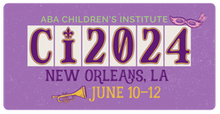 On Tuesday morning at Children's Institute 2024 in New Orleans, La., three booksellers discussed ways of supporting young readers through tough times.
On Tuesday morning at Children's Institute 2024 in New Orleans, La., three booksellers discussed ways of supporting young readers through tough times.
On the panel were Danielle Pernell, bookseller at King's Books in Tacoma, Wash., and Lorie Barber, education director at Anderson's Bookshop in Naperville and Downers Grove, Ill., while Heather Albinson, bookseller at Wild Rumpus in Minneapolis, Minn., moderated the session.
The trio described tough times as a "concentric circle," with layers pertaining to global, local, interpersonal, and internal tough times, and they identified representation as the fundamental first step in making children and teens feel supported. A store's children's section "has to reflect the community," Pernell said, and she noted that representation includes not just race but also gender expression, sexual orientation, neurodiversity, and more.
It was also key, the panelists agreed, for booksellers to be able to support each other. That involves staff members consistently checking in and communicating with each other as well as educating each other. Barber explained that her role at Anderson's includes educating staff, particularly those working mainly with adult books, about things going on in the children's literature world and among young people more broadly. She emphasized the value of children's staff at all-ages bookstores sharing recommendations with booksellers in other departments.
A significant topic of discussion was agency, or as Albinson put it, "giving that child the ability to find resources on their own." Lots of little things could contribute to agency, such as talking directly to the child as well as the parent or guardian; having child-safe step stools located in the children's section so that kids can pull books from the shelves themselves; and putting shelf talkers written by kids at a child's eye-level.
Pernell remarked that when people hear the phrase tough times, they tend to think of very serious books about heavy topics. And while books like that certainly have their place, sometimes the best way to support a child going through tough times is to give them a book full of joy and whimsy. "Joy is a radical act," she said, that can "break through even the toughest times." Adding to that, Albinson suggested creating a variety of displays, some directly addressing big topics, and others focusing on fun or goofy subjects.
The panel also touched on the various gatekeepers that exist in children's reading lives, including educators as well as parents and guardians. With teachers, Barber said, the gatekeeping has increased sharply in recent years because "people are afraid for their jobs." When organizing school visits, faculty members are now asking to see the author's slide decks in advance, which is something that did not happen until recently, Barber pointed out. Educators are "under the thumb" of school boards and operating under book bans forced into place by a "very loud and vocal minority." In her role, she tries to "cut through that fear" so teachers can bring these books back into their classrooms and make "every child feel seen and heard and validated."
Albinson acknowledged that sometimes, booksellers need to curate their messaging in order to "get past the gatekeeper with the credit card," and one way of doing that is "talking to children through the abstract." As an example, Pernell mentioned titles like Bunnybear by Andrea J. Loney (illustrated by Carmen Saldaña) and Neither by Airlie Anderson. The books do not directly mention gender identity at all, but the former is about a bear who feels more like a bunny inside, and the latter is about an animal that's not quite a bird and not quite a bunny. "Putting the abstract out there," Pernell added, "is a great way for you to have that safe space for kids."
Other actionable items booksellers can take home included putting topical books in high-traffic areas, displaying adult books and children's books on the same tough topic together, tagging tough topics in Edelweiss, and adding chairs to the children's section to encourage kids to sit and read. --Alex Mutter

